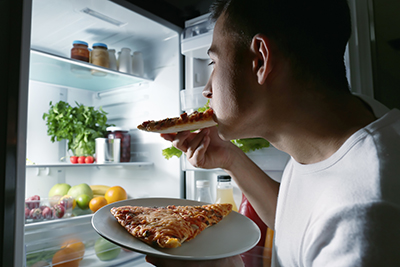By Heather Caslin

Regulation of the body’s metabolism ensures that all organs receive the nutrients necessary for proper function throughout the day and into the night. However, the contribution of the daily biological clock and meal timing to this phenomenon is not well established. A recent PLOS Biology paper from the lab of Carl Johnson (Biological Sciences) is one of the first papers to show that eating a late-night meal can impact how humans burn fat during sleep.
A consistent calorie surplus is considered the primary factor for weight gain, but data on those who work night shifts suggest that altered sleeping and eating cycles increase the risk for chronic diseases like obesity. Animal studies also suggest that limiting food intake specifically to active periods may have beneficial effects on weight and diabetes risk. However, few studies have been conducted in humans.
Lead author Kevin Kelly and colleagues recruited 6 healthy, Caucasian adults over age 50 to assess the effects of meal timing on metabolism in older adults – a population at risk for cardiometabolic disease. A respiratory chamber was used to measure the ratio of carbon dioxide and oxygen that subjects breathed in and out—a stand-in to measure how much fat or carbohydrates they burned—during 2 separate 56-hour sessions. One session required participants to eat at standard breakfast, lunch, and dinner times, while the other session asked subjects to skip breakfast and replace it with a late-night meal. Subjects participated in both sessions in random order and served as their own controls.
The researchers found that when subjects consumed a late-night meal, they burned less fat while sleeping. These results were observed even though calorie intake and expenditure were matched between sessions. Subjects had similar physical activity levels, sleep patterns, and body temperature across both sessions. The results suggest that by eating a late-night meal, subjects had more carbohydrates immediately available and didn’t need to burn as much stored fat while sleeping.
While this study does support a link between meal timing and metabolism during sleep, the long-term implications are unclear, especially as they relate to weight gain. Future studies should monitor additional populations for longer periods of time to further investigate these effects. Moreover, the feasibility of adopting these eating habits outside of the lab environment should be considered, as real life’s innumerable variables can hamper our efforts to maintain regular meal times and as food restriction can lead to the development of disordered eating.
This research was supported by a Vanderbilt Discovery Grant, the Vanderbilt Institute for Clinical and Translational Research, the Vanderbilt Diabetes Research and Training Center, the National Institute of General Medical Sciences, and the National Institute of Neurological Disorders and Stroke.